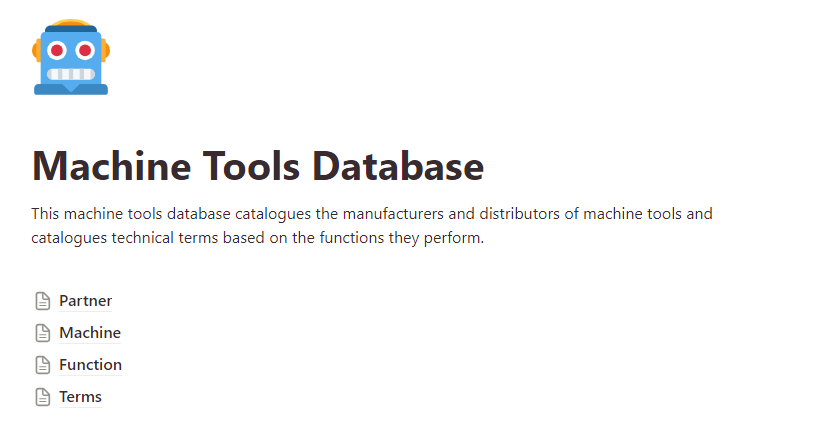This is a summary description of the machine tools database, which has two main objectives. One is to catalogue the partners in the market: the manufacturers and distributors who deal in the various machines.
The other is to catalogue the types of machines that are on the market and link them to the functions that they perform. This enables me to derive technical terms that are based on the machines and their functionality.

Video of the machine tools database

This video of the machine tools database describes its function: to catalogue partners who distribute or manufacture machine tools.
It includes a catalogue of examples of machines from these partners.
Each machine has a function. The database is designed to store a description of the machines’ functions.
Derive technical terms for translation. Beyond the use of the database to approach potential customers, it is a growing resource for technical terms specific to machine tools.
Database Entities
The main database entities are partners (manufacturers, distributors), machines, and machine functions.

Partners
Partners can be distributors or manufacturers, users, parts suppliers or design engineers. The main thing is to categorize partners by size and type, but also to link them to the machines that they distribute or manufacture.
The partner card shows the machines that they distribute, with a count of the number of machines that I’ve catalogued for them and various contact details, including address, telephone number, the language that they use, their size, and some of the prospecting actions that I’ve planned.

This is an example of a distributor with the number of machines that I’ve catalogued for them. You can navigate to the detailed functionality of each machine.
Machines
This is an example of a horizontal machining centre and the description of machining.

Its function is machining; it is distributed by LMO, and the manufacturer is Biglia. And I can link back to all the machines produced by the manufacturer or distributed by the linked partner.
Functions
And then, functions. You can see the functions that I’ve listed, and there are quite a few, with the translation into French. And again, a count of the number of machines with that function.
I use the example of cutting, which is linked to three machines. And again, we can go back into each machine and find out who the manufacturer and the distributor are.

I can refer back to the sources that I’ve used to develop the description of the function. And from the function, you can navigate to the machines which provide the function in question.
And some of the functions have quite extensive descriptions, such as hobbing, for which I have quite a detailed description.
Technical Terms
And finally, I have the technical terms that I have extracted from this context with the French and English translations, and often a detailed description of the term.

Summary
So, in summary, this machine tools database allows me to catalogue partners, manufacturers, and machines in the market.
I relate functions to machines, and I derive technical terms for the purposes of translation based on this analysis.
We translate technical documents.